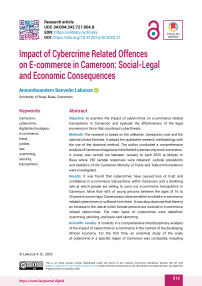Impact of Cybercrime Related Offences on E-commerce in Cameroon: Social-Legal and Economic Consequences
Автор: Lekunze A. B.
Журнал: Journal of Digital Technologies and Law @lawjournal-digital
Статья в выпуске: 3 (3), 2025 года.
Бесплатный доступ
Objective: to examine the impact of cybercrimes on e-commerce related transactions in Cameroon and evaluate the effectiveness of the legal provisions in force that counteract cyberthreats. Methods: The research is based on the utilitarian, transaction cost and the rational choice theories. It adopts the qualitative research methodology with the use of the doctrinal method. The author conducted a comprehensive analysis of Cameroon’s legal acts in the field of cybersecurity and e-commerce. A survey was carried out between January to April 2025 at Molyko in Buea where 250 sample responses were obtained. Judicial precedents and statistics of the Cameroon Ministry of Posts and Telecommunications were investigated. Results: It was found that cybercrimes have caused loss of trust and confidence in e-commerce transactions within Cameroon and a declining rate at which people are willing to carry out e-commerce transactions in Cameroon. More than 60% of young persons between the ages of 16 to 35 years in some major Cameroonian cities are either involved in e-commerce related cybercrimes or suffered from them. It was also observed that there is an increase in the rate at which female persons are involved in e-commerce related cybercrimes. The main types of cybercrimes were identified: scamming, phishing, and bank card skimming. Scientific novelty: it consists in a comprehensive interdisciplinary analysis of the impact of cybercrime on e-commerce in the context of the developing African economy. For the first time, an empirical study of the scale of cybercrime in a specific region of Cameroon was conducted, including a quantitative assessment of youth involvement in illegal activities. The author has developed a theoretical model that combines the utilitarianism, transaction costs, and rational choice concepts to explain the motivation of cybercriminals. Specific socio-legal factors contributing to the growth of cybercrime in the context of the socio-political crisis were identified. Practical significance: The study results are of great practical significance for improving the legal, technological, social and economic mechanisms for countering cybercrime in Cameroon. The proposed recommendations include reforming procedural legislation, expanding the powers of specialized agencies, introducing a system of home addresses and social security numbers, raising the minimum wage, and integrating courses on cybersecurity into educational programs. The data obtained can be used by government agencies, the judicial system, educational institutions and international organizations to develop effective strategies to combat cybercrime and develop a secure digital economy.
Cameroon, cybercrime, digital technologies, e-commerce, fraud, justice, law, scamming, security, transactions
Короткий адрес: https://sciup.org/14134128
IDR: 14134128 | УДК: 34:004:343.721:004.8 | DOI: 10.21202/jdtl.2025.21


